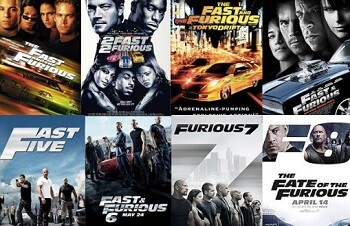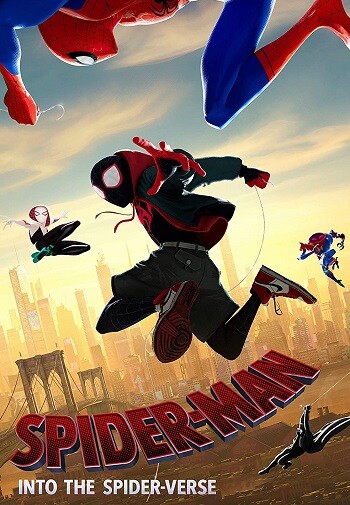Why Movie Franchises Have Such Confusing Titles: Origins

Long gone are the simple times when studios would slap a number on their sequels (or a Roman numeral if they wanted to be all fancy about it) and call it a day. Now, it seems that every single big-budget movie needs to distinguish itself by wedging a bunch of extra words and a colon in its title.

It's almost trite to complain about it at this point. For nearly two decades, Hollywood movies have been awash with colon antics or 'colonics,' and the trend is here to stay. In the coming months alone, movie audiences will get to look forward to watching franchise installments with such vague subtitles like:
- Venom: Let There Be Carnage
- Ghostbusters: Afterlife
- Space Jam: A New Legacy
- Spider-Man: No Way Home
- Top Gun: Maverick
- Resident Evil: Welcome to Raccoon City
The ascension of the movie subtitle (Subtitles: Colon Rising) and the decline of the numbered sequel (Numerals: Age of Extinction) have spawned many theories. Many point to audiences' sensitivity to sequelitis ever since Nightmare on Elm Street taught them the law of diminishing returns. Or the risk of franchise fatigue -- when you won't watch Debby Does Dallas 7 because you haven't seen the first six. Industry insiders instead blame studios' obsession with building universes, which subtitles help promote -- it's called Solo: A Star Wars Story and not Solo: A Star Wars Cashgrab for a reason. They'll also point to the new dominance of Asian markets -- slapping a 4 on Fast & Furious would have made it bomb in China as the number signifies death.

Universal Pictures
But this doesn't explain why reboots, adaptations, and even the first movies of a franchise also have polypoid buzzwords dangling from their colons. Neither does the current trend have much in common with the long tradition of adding long sentences to one-word titles. Unlike numbering movies, which only became a thing with Quatermass 2 in 1957, secondary titles have been fashionable in fiction since the Enlightenment era (Renaissance: Rebirth). With the printing press and public theatre creating both bigger audiences and more competition, authors started using subtitles as a mini-pitch of their story to lure in perusers.
This early apositive advertising ranged from genre descriptors like Middlemarch: A Study of Provincial Life to full-on dual titles like Frankenstein, or, The Modern Prometheus and Peter Pan, or, The Boy Who Wouldn't Grow Up. Conversely, famed playwright and clever asshole William Shakespeare, after having been pressured by his producer to follow this trend, titled his 1602 comedy Twelfth Night, or What You Will in an attempt to create the most eye-catchingly insipid subtitle possible.

Paramount Pictures
But unlike the mini-pitches of yore, modern movie subtitles are in no way meant to explain. In fact, the opposite seems to be more often the case. Movies like Resident Evil: Retribution or The Divergent Series: Allegiant have such pointless filler-word subtitles the only insight they offer is that the screenwriter got a word-of-the-day calendar for Christmas. But it's in this inanity that we find the true reason for the subtitle dominion because studios don't care how hard audiences roll their eyes at whatever Re-gurgitation they slap at the end of their main title. That bit isn't for the audience; it's for the spiders.

Sony Pictures
The search engine spiders, to be more specific. Unlike numerals, throwing a weird word at the end of your movie is a very effective and free way to boost its SEO. One part of the movie title (X-Men) makes it recognizable for us meatbags, the other (Days of Future Past) for the algorithm. Warner Bros. recently admitted to just that when they renamed Birds of Prey as Harley Quinn: Birds of Prey as if blaming its disappointing box office on people trying to Google 'that Harley Quinn movie' and getting redirected to the Wikipedia on hawks. Similarly, the incredibly forgettable The Girl in the Spider's Web, the sequel to The Girl With The Dragon Tattoo sequel, was turned into the buzzword salad The Girl in the Spider's Web: A New Dragon Tattoo Story so that people could type in anything vaguely related to the movie and the title-optimized autosuggestion would take care of the rest.

Disney
This isn't the only annoying titling trend incentivized by SEO. Does it make your blood boil how some reboots confusingly re-use the original title? That's not to mess with film historians; it's to mess with film history itself. Not only do doppelganger reboots piggyback off the title's built-in Google dominance, but, if more successful, will get rid of the old eyesore by bumping it off the first page -- at which point it might as well not have existed in the eyes of the internet. Studios have even figured out how to soothe the raging fanboys by adding a definite article to the tile like in The Suicide Squad or The Batman -- a distinguisher that means nothing to a search engine bot.

Warner Bros.
Or how about those low-budget horror movies with hashtags or numbers in the title? That's not just to appeal to the kids with the apps and the Facebooks. It's an SEO trick called "alpha stacking." Since many online movie lists are organized alphabetically, shlock studios will make their B- movies start with an A or a number to maximize visibility for their target audience: "lazy people" who they assume won't make it past the letter L.

The Asylum Productions
We can lament it all we like, but inane subtitling is now the film industry standard for franchise movies. Corporations like Disney are even retitling their old catalogs to fit the mold, like obsessive fanboys rebuying every Marvel blu-ray so that the covers match. And for those wishing to return to a titling time before George Lucas ruined everything by renaming Star Wars Chapter II to Star Wars: Episode V -- The Empire Strikes Back? Surely, it's only a matter of time before someone invents a browser extension that can automatically translate a "Resurgence" into a "3" or a "Darkness Rising" into a "Part 5 of Reboot 3."
The Cedric saga continues on Twitter: Infinity Doomscroll.
Top Image: Lionsgate, Warner Bros.